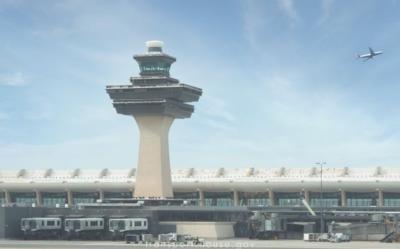Allows Sharing Of Critical Flight Information Using Digital Text Messages
The revolutionary NextGen technology called Data Communications (Data Comm) is now operational at Washington Dulles International Airport.

“There is tremendous benefit in this change in the way pilots and air traffic controllers communicate,” said Jim Eck, Assistant Administrator for NextGen. “Data Comm will allow passengers to get off the tarmac, into the air and to their destinations more quickly. Airlines will be able to stay on schedule and packages will be delivered on time.”
Data Comm was demonstrated recently, showing communication between the Dulles air traffic control tower, a UPS Boeing 767 and a United Airlines Boeing 777. The FAA demonstrated how the NextGen technology enhances safety and reduces delays by providing text-based messaging capabilities between air traffic controllers and pilots.
Representatives from the FAA, UPS, United Airlines, the Metropolitan Washington Airports Authority, the National Air Traffic Controllers Association and the Professional Aviation Safety Specialists were on hand to give their perspective on a technology that is revolutionizing critical communications, beginning with departure clearance services at 56 airports before expanding to enroute airspace.
Leveraging equipment already installed on many aircraft, air traffic controllers and pilots are sending and receiving important flight information using digital text-based messages. At towers with Data Comm such as Dulles, controllers enter flight departure clearance instructions into a computer and push a button to electronically send the information to an aircraft’s flight deck. Flight crews view the information, press a button to confirm receipt, and press another button to enter the instructions into the aircraft’s flight management system.
Time savings is another major benefit. For instance, when pilots read back a series of complicated waypoints in a clearance with even one mistake – called a “readback/hearback” error – they must repeat the instructions until they are correct. A departure clearance using voice communications can take two to three times longer than one via Data Comm – and even longer as traffic increases. With Data Comm, transmissions are quickly sent and received electronically to help avoid delays. This benefit becomes even more pronounced during bad weather, when Data Comm enables equipped aircraft to take off before an approaching thunderstorm closes the departure window while aircraft relying solely on voice communications remain stuck on the ground waiting for the storm to pass.
Data Comm is expected to save operators more than $10 billion over the 30-year life cycle of the program and the FAA about $1 billion in future operating costs.
The first Data Comm-equipped airports – Salt Lake City and Houston’s George Bush Intercontinental and William P. Hobby – received tower departure clearance services eight months ahead of schedule in August 2015. The FAA and its industry partners are on target to deliver Data Comm to 56 airport towers by the end of the year.
Data Comm is operational at these airport towers:
- Albuquerque
- Atlanta
- Austin
- Baltimore
- Boston
- Burbank
- Charlotte
- Cleveland
- Denver
- Detroit
- Fort Lauderdale
- Houston Bush
- Houston Hobby
- Indianapolis
- Las Vegas
- Los Angeles
- Louisville
- Memphis
- Miami
- Nashville
- Newark
- New Orleans
- New York John F. Kennedy
- New York LaGuardia
- Oakland
- Ontario
- Orlando
- Philadelphia
- Phoenix
- Pittsburgh
- Portland
- Sacramento
- Salt Lake City
- San Antonio
- San Diego
- San Francisco
- San Jose
- Santa Ana
- Seattle
- Tampa
- Teterboro
- Washington Dulles
- Washington Reagan
- Westchester County
- Windsor Locks (Bradley)
(Source: FAA news release. Image from file)
 Airborne 04.16.24: RV Update, Affordable Flying Expo, Diamond Lil
Airborne 04.16.24: RV Update, Affordable Flying Expo, Diamond Lil ANN's Daily Aero-Term (04.20.24): Light Gun
ANN's Daily Aero-Term (04.20.24): Light Gun Aero-News: Quote of the Day (04.20.24)
Aero-News: Quote of the Day (04.20.24) Aero-News: Quote of the Day (04.21.24)
Aero-News: Quote of the Day (04.21.24) ANN's Daily Aero-Term (04.21.24): Aircraft Conflict
ANN's Daily Aero-Term (04.21.24): Aircraft Conflict



